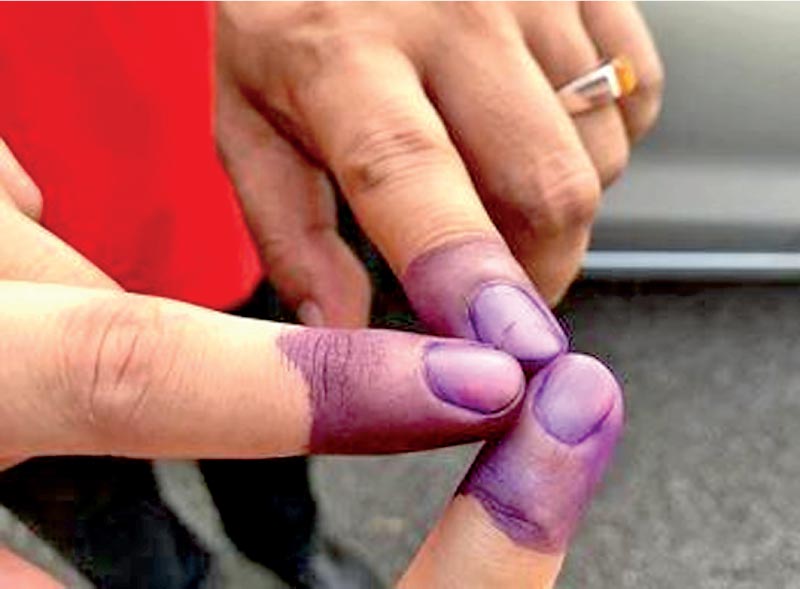Friday Feb 13, 2026
Friday Feb 13, 2026
Monday, 9 September 2024 00:22 - - {{hitsCtrl.values.hits}}

 Background
Background
Campaigns for Presidential Election 2024 are in full swing. Manifestos of all major candidates are issued. Yet again much of the public is clueless or confused on who would be the ultimate saviour of Mother Sri Lanka. The focus of this article is not necessarily about the merits or demerits of individual Presidential candidates, but about basic rights of voting franchise for ‘all’ eligible/registered voters.
In this context a recent warning of Dr. Rajitha Senaratne about expat voters needs further scrutiny. The author considers that his statement was untimely, unwarranted, completely undemocratic, and indeed violates the Election laws, for the reasons explained in this article.
The one-million-dollar question to ask is whether Dr. Rajitha has the legal authority to threaten the expats? What is the basis of his alleged claim of impending disaster (solely) due to expats’ voting patterns? Why is there no adequate outcry from the public?
Dr. Rajitha’s threatening statement
During a recent press conference Dr. Rajitha noted that as the upcoming election approaches, some Sri Lankans living abroad may consider returning to cast their votes. However, he suggested that if these expatriates plan to support NPP leader Anura Kumara Dissanayake they should reconsider coming back to vote, and if they do, they should stay rather than return to their overseas residences.
Ironically, his abuses were against supporters of single candidate which is yet again breaking the basics of democracy. Why segmenting or treating expats differently based on voting intentions in the PE2024?
Minimal reactions from stakeholders
There were limited reactions for Dr. Rajitha’s statement. At the time various groups are requesting Advanced Voting Rights or facility to vote from overseas or away from their registered districts, the statement of Dr. Rajitha needs objection by all the rights groups irrespective of their choice of candidates. (See Expats’ right to vote | Daily FT: https://www.ft.lk/columns/Expats-right-to-vote/4-765044)
Despite his verbal abuse of potential expat voters, the silence of so-called democratic forces is more than deafening. Where are the INGOs/Election Monitoring Forums or political commentators or analysts? Why are they keeping silent?
Thanks to the complaint filed by NPP at the Election Commission, the Election Commissioner’s statement of progress in investigations is a welcome move. However, how the Election Commission or law enforcement authorities would escalate this matter remains to be seen.
Wrong assumptions
Rajitha’s statement contained many assumptions that may not be correct. Few of them are listed here:
Fact vs. Myth
The election outcome (in the absence of voting rights of overseas workers in their domiciled countries) is entirely decided by Sri Lankans living in the island. Comparatively a very small percentage of eligible voters, might choose to travel to Sri Lanka for voting purposes. This minority and limited number of voters may not influence the election outcome.
On the other hand, a vast majority of migrated workers are busy with their own problems. They are helpless without any voting right unless they travel back to Sri Lanka. Some of the semi/skilled lot, at most, become social media warriors in support of their chosen candidate.
Why preference for Western capitals?
The mistake of connecting expats with Western capitals is not limited to Dr. Rajitha. The recent travel itinerary of AKD to selected Western capitals is also an indication of hypocrisy on the part of NPP. Why have any of their leaders not travelled to Middle East or other regions where most of the migrant workers are present? Was the selection of pre-election travel locations linked to campaign financing? Or was it purely due to the limited freedom to organise political meetings in those west Asian countries?
Why not consider expats as assets rather than liability?
During the economic turmoil, authorities were begging expat workers (and others of Sri Lankan origin) to remit their earnings abroad. Some called the migrant workers as “Economic Ranwiruwo.” The love of Mother country for most of the migrant workers is much higher than the majority of the politicians who were perceived to be most selfish by the public.
Expats of Sri Lankan origins (including dual citizens as well as diasporas from all religions) can contribute to the economic prosperity of Sri Lanka by bringing their expertise, capitals, and facilitate FDI. For example, contribution of Central Bank Governor Dr. Nandalal (who happens to be an expat) in the aftermath of economic crisis cannot be taken lightly.
We need a mindset of perceiving the migrant workers and other expats as assets rather than liabilities (as implicated by Dr. Rajitha). With a carefully managed program, expats could contribute at much higher level for the national economy compared to current levels.
Way forward
The current election format remains obsolete, costly, and discriminatory. Obsolete, since it still revolves around a manual election process while most of the world (including the largest democracy of India) has long ago switched to an Electronic Voting system. The Election Commission appears toothless with respect to the election violence and obvious breach of election laws by all the contestants. Discriminatory in the sense that many marginalised sectors (such as internally displaced or migrated/disabled/prisoners) as well as migrant workers (overseas) are denied voting rights at their respective locations.
In a Briefing Paper (Sept 022) by Democracy Reporting International, Author Maral Morry analyses and elaborates how Advanced Voting Rights could be implemented in Sri Lankan context (20632020-09-16-SR-Advance-Voting-Briefing-Paper.pdf (democracyreporting.s3.eu-central-1.amazonaws.com).
The author wrote to current parliamentarians and other stakeholders on the need for expat voting rights. However, most of them did not even bother to respond to my mails. None of the current Presidential candidates (nor their teams) responded to mails regarding expat voting issues. This is a sad affair since “none of the Presidential candidates” are currently keen in supporting the expat voting rights.
What we urgently needed is the political willpower of a future government along with support from all stakeholders to revamp the election laws to facilitate Advance Voting rights for all eligible, marginalised and overseas migrant workers. If there is a will, there is a way!
(The writer has been a migrant worker for the last three decades and advocates for expat rights. The opinions are his personal unless quoted with references. He can be contacted through email: [email protected].)